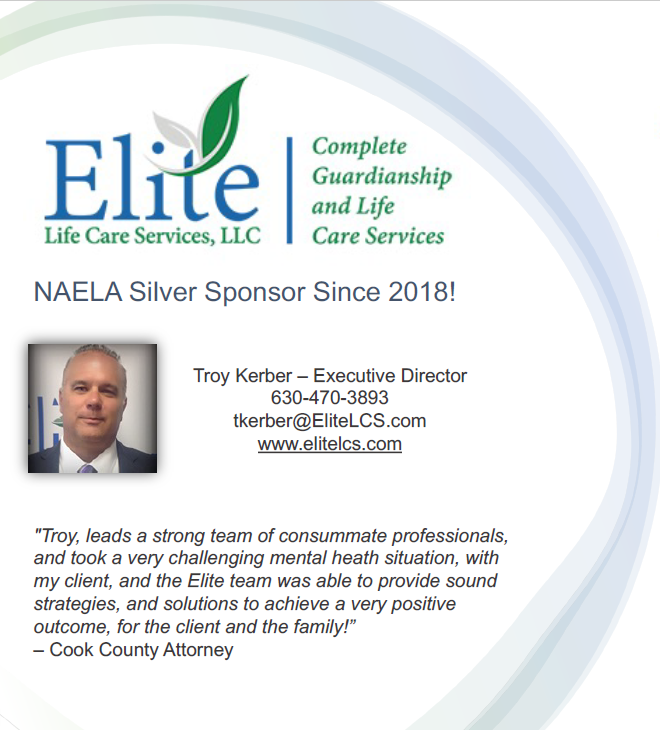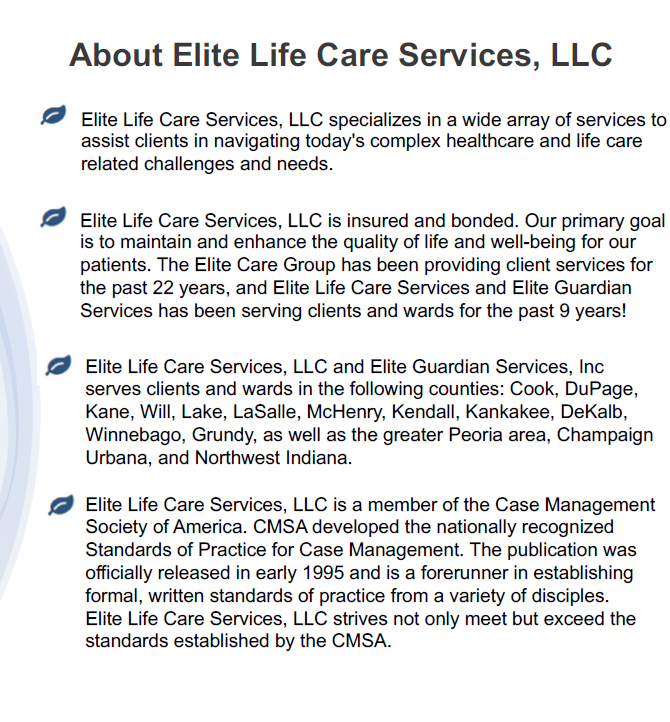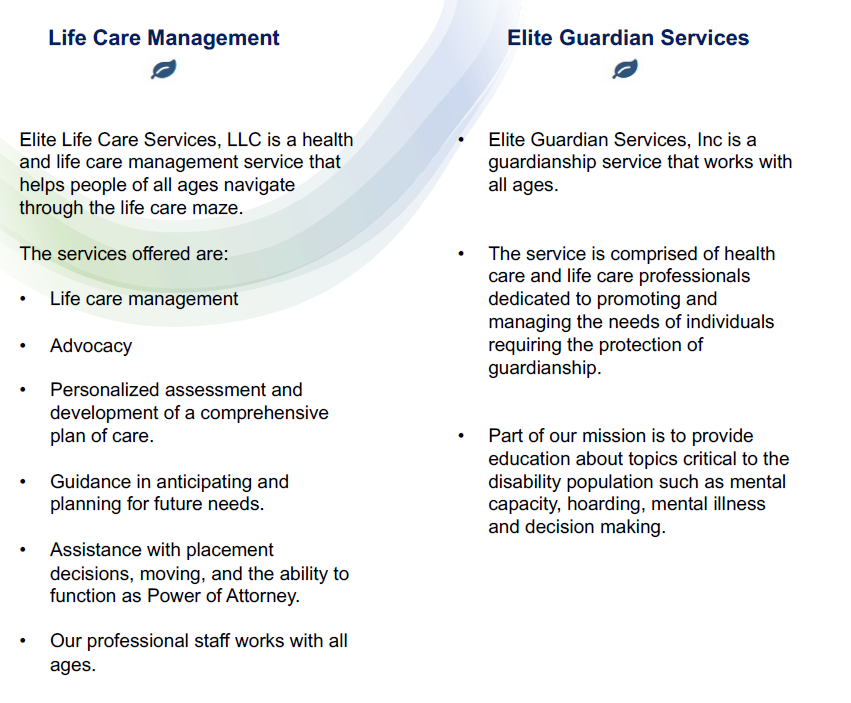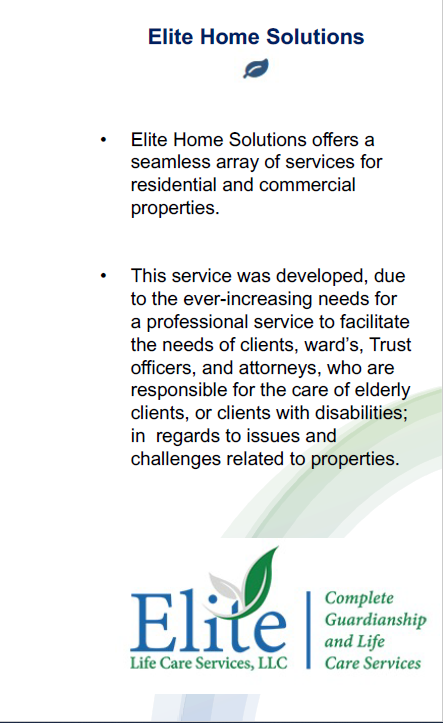Elite Life Care Services, LLC Newsletter | Winter 2021



“Winter, a lingering season, is a time to gather golden moments, embark upon a sentimental journey, and enjoy every idle hour.” – John Boswell
Holiday Greetings - what a year it has been! If you are like me, there are times we look back over 2021 in wonder and amazement. We went through moments of normalcy and moments that seemed to be flashbacks to 2020. It often left me shaking my head and saying out loud from time to time, “I never saw that coming!”
The path back to normal has been bumpier than anticipated, but we’ll get there! Here’s hoping everyone has a wonderful and healthy holiday season! See you in 2022!
Sincerely,
Troy Kerber
Executive Director
630-470-3893
Elite Life Care Services
Elite Guardian Services
www.elitelcs.com
A Day in the Life (or Evening) of a Care Manager! “The Elite Difference!

The roles of essential workers are simply busier, then ever. The same can be said, for a day in the life, and evening, for the care manager, life care manager, case manager, geriatric care manager, or whatever the preferred semantic, of the day is, that describes our wonderful profession!
Elite Life Care Services and Elite Guardian Services are available to their clients and wards, on a 24/7 basis! The “Elite difference” is a never ending constant, within an ever changing world, and universe! What is the “Elite difference” ? The Elite difference is a philosophy, not just another mission statement. This philosophy can take on several meanings, when applied, as, “ A Day in the Life , or Evening of an ELCS care manager!” The Elite Difference, entails the following, ELCS treats every client and ward, as to how we would expect our own family members to be treated.
That difference includes a passion for the profession, compassion, empathy, creativity, and a professional approach to solving the clients health, and life challenges! As experts in this field, we are available 24/7.
Quite, often, the ELCS care manager starts their day, before the designated hours, of a normal 9am-5-pm business day, or after hours, beyond the 6pm threshold. Why is this? With the complexities of clients and wards needs, ranging from complex mental health cases to unexpected developments at home, for an elderly client, anything can happen, at anytime! Here are some real life scenarios!
1. The client/ward enters a manic state, as a result of a stressor, or unperceived trigger reaching out for help! These calls have no set timeline, and will continue, until they reach their lifeline, which is the ELCS care manager
2. The inability of a hired caregiver, or home health nurse to show up, at a scheduled shift, is always handled ,and solved by an ELCS care manager
3. The spontaneous, late ordered, and needed medications ,or essential groceries, that are needed, and solved by the ELCS Concierge
4. Night time is the right time! Many critical discussions, take place, after hours, with attorneys, who are passionate, and committed, as ELCS, in regards to a myriad of client/ward issues
Also, evening consultations, with family members can be the only time, that they are available to discuss the plan of care, for their loved ones!
5. The unanticipated property related situation occurs, such as loss of utilities, at a client/ward residence, water damage to the basement, or the caregiver and client are locked out of their residence. Ultimately solved, by the ELCS care manager
6. The unplanned, late discharge, of a client/ward, from the hospital. The client/ward has many needs to be addressed, in order to make this transition home a success! Aptly, solved by the ELCS care manager
7. The after hours call, in regards to a mental health client/ward, that has been arrested, for an alleged incident. Coordination of needed legal, and health services, and accurate reporting, that is essential for the overall well being, of the client/ward
8. The out of state family member, who requires consultation, and reporting exclusively after hours , in regards to the care pathway, of their loved one.
9.The essential, unplanned visitation, and wellness check, on behalf of a client/ward, at their respective skilled nursing facility to ensure, that the care plan, and quality of care is evident
10. The accessibility of the ELCS Executive Director 24/7 for notification, acceptance, and appointment, for an emergency guardianship, or emergency agent, for Power of Attorney situation.
11. Often, in our profession; since we are extremely passionate in our work, our most creative ideas originate, after hours, that we include in a care plan, to further benefit a client/ward during normal service hours.
12. During this pandemic, the ELCS care manager currently is looking, for updated information, from reliable sources, for those clients/wards, that are under quarantine. Often, those critical details are acquired, after hours.
13. The successful additions of our AMT programs that consist of art and music therapy, and WRAP programs that consist of wellness, recovery, action, plan, that continue to add quality and benefits to the lives of our clients and wards
As experts in our field, and as the “Guardian Angels” of our clients and wards; there are so many more unique scenarios, and situations, that arise, that haven’t been mentioned. At the end, of the day, or the beginning of the day; The Elite Difference philosophy continues to play a pivotal role in serving our clients and wards in Chicago, the western suburbs, the south suburbs, the northern suburbs, and northwest Indiana!
For any questions, regarding Elite Life Care Services, or Elite Guardian Services, please contact Troy Kerber, Executive Director, at 630-470-3893, or tkerber@elitelcs.com

The end of the year is a busy time. On top of that, the seasons are changing (winter officially began on December 21), which can affect your physical and mental health. Now more than ever, it’s important to take care of yourself!
With shorter days and colder weather on the horizon, it’s important to maintain healthy habits. And that means doing more than just bundling up. Here are six ways to stay healthy during cold weather:
- Get a flu shot. Because of the COVID-19 pandemic, it’s more important than ever to help prevent the spread of flu . No one wants to come down with the flu — it can cause symptoms such as coughing, congestion, fever, and fatigue that can last up to two weeks. Protect yourself and your family from getting sick by getting the flu vaccine. Recent studies show that flu vaccination reduces the risk of flu between 40 to 60 percent.
- Wash your hands often. Winter is peak season for contagious illnesses; in addition to COVID-19, we still need to take precautions to protect against cold and flu. The most effective way to remove and prevent the spread of illness-causing germs is to wash your hands frequently. When washing your hands, remember to get a good lather of soap on your hands, and scrub for at least 20 seconds with warm water. If soap and water are not available, use an alcohol-based hand sanitizer to help slow the spread of viruses.
- Eat for immunity. As part of your efforts to stay well and avoid the cold and flu this winter, it’s important to eat healthy foods that support your immune system, including mushrooms, garlic, citrus fruits, herbs and spices, probiotics, prebiotics, and chicken soup. For example, yogurt is one of the best sources of probiotics. Apples, bananas, garlic, and onions are good sources of prebiotics.
- Keep moving! The winter months can be a challenging time to stick to your exercise routine. Not only can preparing for the holidays leave you feeling drained, the cold weather can also be a deterrent to getting outside for some exercise. While it’s important to stay active during the winter, it’s also necessary to follow local guidelines on social distancing to stay safe. Consider working out at home with virtual exercise classes or exercise equipment, such as a treadmill or stair climber, and try to add extra movement into your routine throughout the day. When the weather is nice, take the opportunity to get some fresh air with a hike in one of the area’s many trails.
- Get some sun. While the availability of sunlight is limited during the winter months, it’s important to spend some time outdoors even when it’s cold. Sunlight has been shown to help improve your mood by boosting the release of a hormone called serotonin. Exposure to sunlight is especially important to help treat those suffering from seasonal affective disorder (SAD), a form of depression. Exposure to sunlight also helps regulate your circadian rhythm, which controls your body clock and affects sleep habits.
- Maintain good skin health. Cold weather can wreak havoc on your skin, leaving you with dryness, flaking, cracking, and in some cases, eczema. To keep your skin moist and healthy through the winter, be sure to drink plenty of water, hydrate your skin with an ointment moisturizer, and use sunscreen whenever you’re out during the day. Exposure to the sun’s rays, even in the winter, can still have damaging effects on your skin, so be sure to choose a sunscreen that has an SPF factor of 30 or above to ensure adequate protection.
Winter Slips, Trips and Falls
The best way to fight injuries are to prevent them ever happening in the first place. Here are some tips to prevent those nasty winter slips and falls.
- Wear appropriate footwear. Shoes that provide traction on snow or ice are important. Rubber soles and boots or shoes with grip and texture can help keep you stable on ice and snow. Make sure your shoes fit properly and have low, wide heels. Avoid plastic or leather soles.
- Keep your hands free! In cold weather, wear gloves to help keep your hands warm and out of your pockets. This way if you should fall you can better catch yourself using your hands or arms. Don’t get distracted with a cell phone while walking in icy conditions.
- Take smaller, shorter steps when walking for stability. In slippery conditions, walk slowly using small, short steps. If conditions are extra slippery, try shuffling along slowly without picking up your feet, in a gliding type motion. If snow or grass is available walk on these textured surfaces instead of on slippery walk ways.
- Use handrails if available. Having something stable to hold on to can make a big difference should you slip. If you use a cane on occasion, it would be advised to use your cane in cold/icy weather to provide better stability.
- Step down, not out, from your vehicle. When getting out of a vehicle, swing both legs out and place both feet flat on the ground before getting up. Using both feet will give you more stability than just one foot.
- Plan ahead. Give yourself plenty of time to get where you’re going. When you’re running in a rush, chances of falling increase.
- Watch for slippery floors inside. In winter all kinds of water and ice can be found inside near entryways. Show caution and enter any building or your home by first taking a moment to look down to see if there is any hazard.
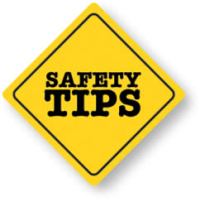
What to do if you take a fall
- If you fall, no matter if it is forwards or backwards, try to allow your arms and hands to catch you.
- It is important to protect your head and if you fall backwards, tuck your head upwards. Let go of any objects you are carrying — protect yourself instead.
- After the fall, check yourself for injuries. If you’re hurt or unable to get up, yell for help. If your cell phone is easy to reach, call for help on your phone. Do not try to get up by yourself as you could cause further injury by having another slip or fall.
- If you’re not hurt or feel well enough, you should try to get up from the ground as safely as possible. Try to roll onto your side and slowly pull yourself up so that you’re on your hands and knees.
- Crawl towards a sturdy object that can support you as you try to get up, such as a solid chair, stairs, or a tree. Sit and rest for a few minutes before you try to do anything else.
In the absence of a medical emergency, most of the pain after a fall will be due to inflammation
Use pain, bruising, and swelling as a guide. Tenderness if you push on it. Ability to move is not a good indicator. If you can’t move, you clearly have a problem. But most people with a fracture can still move a little, and some can move a lot.
If you suspect you have a broken bone, see a doctor or physician assistant immediately.
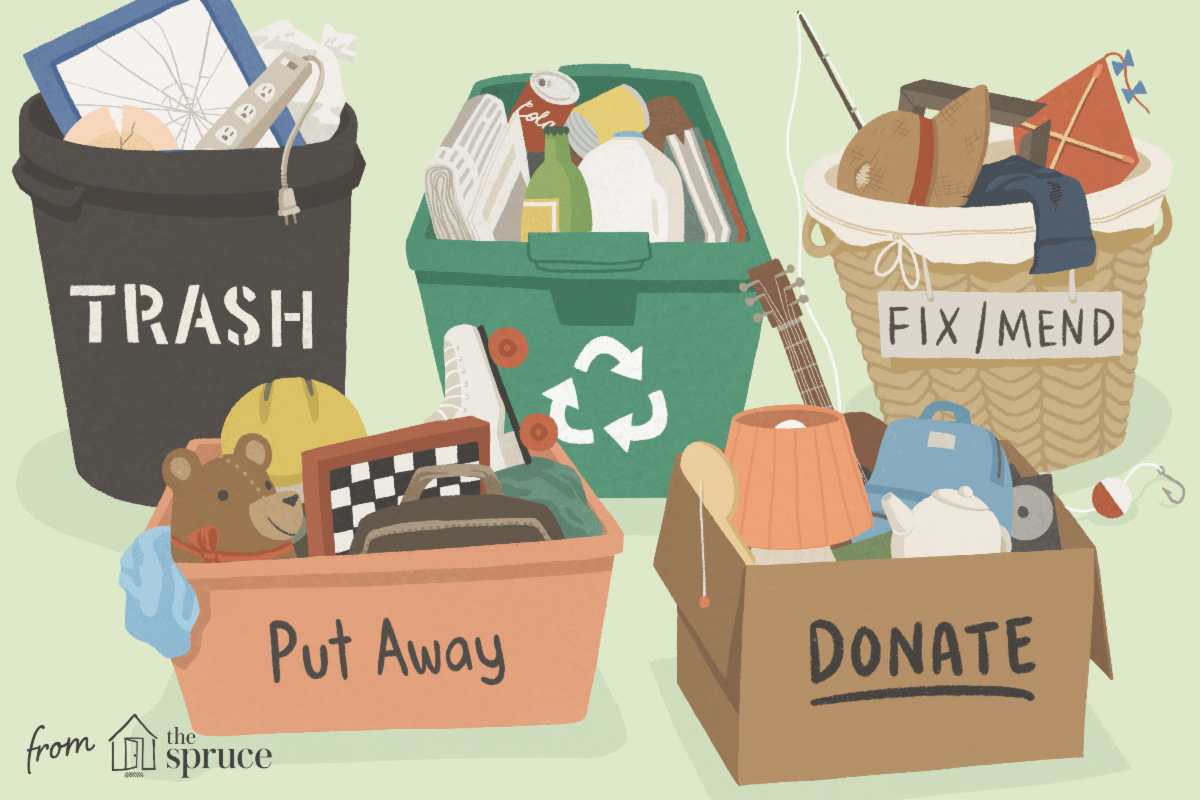
Tips on Organizing/Decluttering Your Home This Winter
Cold air, snow, and ice have gripped the country. You may not be outdoors much, but the extra time can be spent organizing and decluttering your home. A few helpful items may be no farther than your local hardware store.
In fact, cleaning things up can have health benefits—physically and mentally. Too much clutter can cause stress and depression. With some home improvement, a cleaner space helps people:
- Stick to exercise plans
- Eat healthier
- Improve relationships
- Boost productivity
- Sleep better
Best Ways to Clean Up Your Home
Neaten Up the Living Room: Layout is key; organize furniture so it’s easy to walk, and set up designated television and social areas. These are among the most efficient home improvement ideas. Designate storage space for books and magazines, and for remote controls. Even try decorative baskets for reading material or open shelving to keep things looking neat.
Home storage bins, such as Sterilite Storage Boxes from Brinkmann’s and other home improvement stores, help stow toys, gadgets, cleaning products, and other household items out of the way.
Tips to tidy up the kitchen: Organizing your refrigerator makes it a dream instead of a disaster. A chalkboard inside the pantry door helps track shopping items without the paper mess. In the cupboard, install a magazine rack that can help store lids; a CD holder doubles well as a lid holder, too. Cleaning out the cabinets and pantry every now and then helps as well.
Clean out the closet: If your clothing is stacked to the ceiling, sort your shirts, shoes, dresses, pants, etc. by type. Identify what you don’t need and throw it out. Sort everything that’s left to neaten up your wardrobe. The same goes for linen closets; throw away or donate stained, torn, or worn-out towels, washcloths, and sheets. Smaller see-thru storage makes your closets more efficient so items are easy to track; you can easily find them at any home good store.
Bathroom organization: The bathroom is heavily used, yet relatively small. Give everyone their own shade of towel, sheet, and toothbrush so they know where to find it and put it away. Go through the cabinets, throwing away expired cosmetics and neatening up what’s left.
Make the bedroom more livable: The tops of nightstands, dressers, and chests tend to get stacked full of papers, books, pens, and a host of personal items. Make a habit of throwing away what you don’t need, including gadgets that don’t work or empty tissue boxes. Don’t stuff unwanted items back into drawers. Clothing that’s out of place should be folded up or hung in its proper place.
Buy Efficient Home Storage Solutions
For any room, an excess of unneeded or out of place items is problematic. Small storage bins, and even larger options, such as the Sterilite Wheeled FootLocker, a 92-quart capacity storage unit, help. Brinkmann’s also sells a variety of hooks, hangers, and organizers to make your room, closet, and garage storage more efficient. For organizing smaller items, Ziploc bags work, while a heavy-duty Rubbermaid Roughneck Storage Tote stores valuables while protecting them against cold, rugged conditions.
How to Cope When You Are Alone this Christmas

You might be alone on Christmas for different reasons, such as the death of a loved one, living far from relatives, or because of social isolation. If you have social anxiety disorder (SAD) and don't have close relationships with family or friends, loneliness at Christmas could be particularly hard.
In general, there are three ways to cope with being alone at Christmas. First, you can address your mental state and how it is contributing to your loneliness. Second, you can find things to do at Christmas that make you feel less alone. And third, you can plan ahead so that you are not alone this time next year if you don't want to be.
Christmas is the perfect day to take the time to appreciate what you have in life, be it good health, a place to live, or food on the table. Having gratitude will also help you to move past anxiety, as you learn to live in the present moment and be mindful of your surroundings. One way to practice gratitude is to write down three things you are grateful for on this day.
What if you're plagued by negative thoughts? If you feel like you don't know how to cope with being alone, ask yourself, "What would I do if I did know how to cope?" You have more power over your thoughts and how they make you feel than you think.
You can choose to feel lonely because you are alone, or you can choose to feel grateful for the positive things in your life. Reframing your negative thoughts is the basis of cognitive behavioral therapy (CBT), an effective treatment for social anxiety disorder.
Tips for Coping With Loneliness at Christmas
One way to cope with being alone on Christmas is to actually go out and do something productive. Rather than spend the day at home alone, find something that you can do that fits with your mindset and mental state for the day.
For example, if you feel full of energy, and the weather is decent, go for a long run. If you feel social, consider attending a church service to be in the presence of others. Below are some other ideas to keep you from focusing on the fact that you are alone this holiday.
Say 'Yes'
Perhaps you are alone this year because you turned down invitations. Know that it's OK to call those people back and say "yes." This is often a problem for those with social anxiety—you turn down invitations only to regret it and feel lonely afterward.
Take Time to Volunteer
One way to gain a better appreciation for the good things in your life is to get involved in volunteering. During the holidays, volunteering is a way to connect with others, boost your self-esteem, and bring joy to people who are less fortunate. Consider offering to help serve dinner at a soup kitchen, bring gifts to a children's hospital, or visit lonely residents at a nursing home.
You might even consider doing a grocery run for a neighbor, relative, or friend who can't leave the house. If you're helping someone who is sick or has a weakened immune system, remember to take precautions to protect them and yourself. This may include wearing a face covering and practicing physical distancing. If you feel nervous about doing these social activities, all the better; it's a chance to test your boundaries and expand your social skills. In fact, research shows that practicing kindness may reduce your tendency to avoid social situations.
Host an Orphan Christmas
Plan an "orphan Christmas" for those who have no one to spend the holiday with, or join a group of people in similar circumstances. If you feel anxious about reaching out, consider that other people who are alone on Christmas may feel isolated, lonely, and nervous to call on you, too.Get to Work
If you enjoy your work, and you have the option to work on Christmas, spend the day being productive. This is a smart choice if your job involves interacting with co-workers or customers; being at work may help you to feel less lonely. If you don't have the option to work on Christmas, spend the day working around your home or on a project that you've put off for too long.
Celebrate Online
Do you have online friends? Do you have long-distance relatives? Host an online Christmas by setting up a Skype chatroom or Facebook group. People can drop in and out as they please, and you don't have to cook, clean, or even get off the sofa. As an added bonus, you'll have a chance to practice your social skills as you welcome new people to the group and catch up with old friends. You'll also be keeping your vulnerable loved ones safe as you socialize virtually.
Enjoy Solitude
If being alone on Christmas is unavoidable, plan a day for yourself. Buy something online to treat yourself, cook your favorite foods, or plan a movie marathon. Or do something offbeat like learning a new language or starting work on the novel that's always been in your head.
Christmas is a day to indulge in whatever makes you happy.
If You're Having Difficulty Coping
If you are feeling really down about being alone on Christmas and can't pull yourself out of it, reach out for help. Call a friend, family member, or a helpline. Regardless of whether you are physically separated from people on Christmas, you should never feel like you are lacking support. There are people who would love to hear from you and trained volunteers waiting to support and counsel you. If you or a loved one are struggling with social anxiety disorder, contact the Substance Abuse and Mental Health Services Administration (SAMHSA) National Helpline at 1-800-662-4357 for information on support and treatment facilities in your area. For more mental health resources, see our National Helpline Database.
More About Elite Life Care Services, LLC
